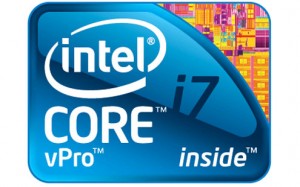 Chip maker Intel today announced the launch of its third generation Intel Core vPro processors, codenamed Ivy Bridge, designed for use in business laptops, desktops and “intelligent systems”.
Chip maker Intel today announced the launch of its third generation Intel Core vPro processors, codenamed Ivy Bridge, designed for use in business laptops, desktops and “intelligent systems”.
Like the Ivy Bridge Core i-series processors launched last month, the Core vPro processors are based on Intel’s 22nm microarchitecture and, when paired with Intel’s Q-series chipsets, offer a 10-20 percent improvement in performance. They also feature better graphics and faster response time, thanks to Intel’s Smart Response, Rapid Start and Smart Connect technologies.
However, the Core vPro processors go a step further by embedding security into the silicon, providing hardware-level protection for e-banking, e-commerce, virtual private networks and other secure transactions.
Intel’s identity protection technology (IPT) defends against identity theft by using a one-time password and embedded public-key infrastructure from Symantec. This enables businesses, governments or websites to check that a legitimate user is logging in from a trusted PC, and create a non-spoofable path for user input and display output.
The Core vPro processors also enable endpoint security management from McAfee which, together with Intel’s Active Management Technology (AMT) 8.0, allows IT professionals to remotely manage PCs that are powered off or disabled, as well as remotely fix compromised PCs and apply security patches.
Intel said that large-scale retailers can save millions of dollars in service calls with the ability to remotely manage systems using AMT, and industrial computing systems can achieve greater efficiencies by consolidating multiple automation functions onto one platform.
All Ivy Bridge processors also include Secure Key (for secure encryption) and OS Guard (to defends against attacks). Intel has teamed up with Accenture to provide 24/7 computer diagnostics and repair services to enterprise clients using ARROW (Accenture Remote Resolution Online Workforce solution).
The new chips are intended for use in ultrabooks, laptops, desktops, workstations and all-in-one PCs, as well as “intelligent systems” in retail, healthcare and manufacturing. These include medical diagnostic equipment, digital advertising signs and high definition video conferencing systems, which can make use of the Core vPro’s compute performance and graphics capabilities to quickly process digital images.
Meanwhile, Lenovo and HP have both unveiled enterprise-class ultrabooks running on third-generation Intel Core vPro processors. The Lenovo ThinkPad X1 Carbon Ultrabook and the HP EliteBook Folio 9470m both have 14-inch screens, weigh less than two kilograms and are roughly 19mm thick.
“Thinner and lighter devices are not just nice to look at, there are a necessity to get the job done anywhere, at any time,” said Rick Echevarria, vice president of the Intel Architecture Group. “These machines are built for business and engineered for security while delivering no-compromise user-centric experience.”
The performance improvements also provide the processing power needed to handle big data sets and manipulate them faster. Echevarria said we are now at a point where big data applications are “finding their way from the data centre to the end point,” adding that big data has become a “top tier concern for businesses”.
Echevarria said that Intel was working with its OEMs to make vPro available at mainstream price points for desktop systems, but added that the processor family was growing aggressively in its current segment, which is currently in systems that cost $850 (£530) and above.





